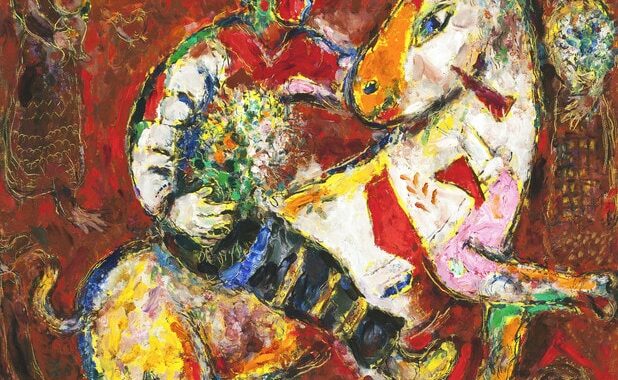By Sara Klein Wagner
A week before the Oct. 7 attacks on Israel, Howard and I visited the Milwaukee Art Museum. I could not pull myself away from Marc Chagall’s painting “The Horseman,” as its bright reds and oranges drew me in and piqued my curiosity. Circling back to the painting again and again, I found myself lingering while a docent described the picture to a touring group.
She shared how Chagall’s work was largely inspired by his childhood in Russia as a Jew. This piece centers on a mounted figure on a horse with its head turned inward, the animal’s image evoking the shape of a human heart. She explained how themes of love, courtship, and family – existed within a Jewish community beset by houses aflame in the background – an obvious reference to pogroms. I felt a chill as she peered down on her iPad and read – in a flat monotone – the textbook description of a “pogrom”:
“The pogroms of eastern Europe were violent rioting and ransacking of Jewish villages,” I listened as she continued reading aloud how pogroms were intentionally planned attacks pulling Jews out of their homes, raping all the Jewish women and murdering as many Jews as possible.
Then, as the docent told the assembled group that the “Russians killed the Jews because they believed the Jews were responsible for killing Jesus,” a couple passed by with the man giving a thumbs-up and smiling as he whispered to his companion: “That’s right.” At that instant I remembered an ongoing, difficult truth: We cannot assume others understand our history and the legacy of hate our ancestors experienced.
I don’t know what message Chagall hoped his painting would prompt. Perhaps its central figures emphasize the resonance of love, hope, and celebration, while somewhere in the background we’re reminded never to forget the past. Years from now another generation will understand the October 7 attacks only from what is passed down by survivors, rescuers, historians, and artists. I believe this will be intrinsic to our modern story of the Jewish people – indeed how could it not be. The pogroms in Eastern Europe had a profound impact on the dream of Zionism and the accompanying desire to live freely and safely in a Jewish state.
Today we are carrying the heaviest of hearts and anxieties as more than 203 hostages are being held in Gaza – a circumstance frightening beyond our worst nightmares. We also have a responsibility to those who were murdered in Israel just as we have to those murdered in pogroms, the Shoah, the Munich Olympics, prior wars and at Pittsburgh’s Tree of Life synagogue. We must support those in trauma now, and we must tell the story of this attack, painful as that task may be. It is our story to tell, along with our obligation to remain hopeful in the face of unspeakable tragedy.
Without memory, there is no culture, Without memory, there would be no civilization, no society, no future. – Elie Wiesel
We will have a future and there will again be days filled with love and even joy, just as Chagall depicted, as we must always remember and honor their lives. May their memories be for abundant and everlasting blessings.
To donate to JFNA’s emergency campaign and learn about other resources for information and action, go online at jewishlouisville.org/actnowforisrael.
Sara Klein Wagner is President & CEO of the Jewish Federation of Louisville and the Trager Family JCC





